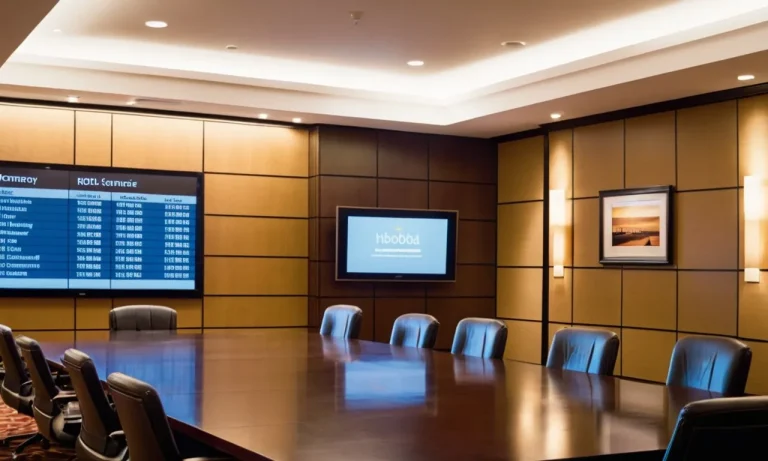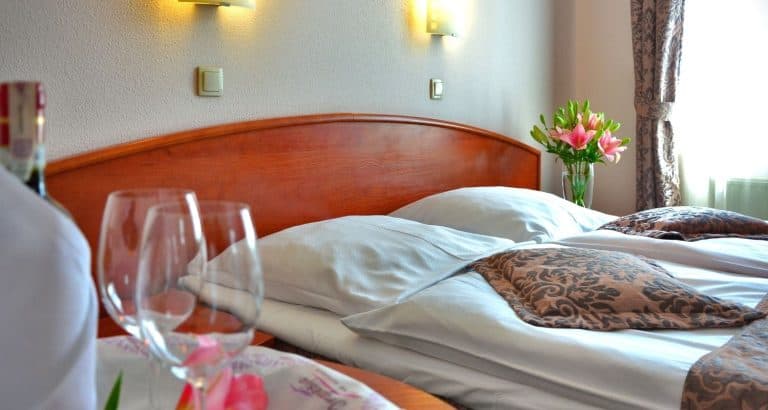How To Stay Long-Term In Hotels: A Comprehensive Guide
Traveling for extended periods or living a nomadic lifestyle often requires finding suitable long-term accommodation. While hotels are traditionally associated with short-term stays, many travelers seek the convenience and amenities they offer for longer durations.
If you’re planning an extended trip or considering a temporary living arrangement, staying long-term in hotels can be a viable option.
If you’re short on time, here’s a quick answer to your question: To stay long-term in hotels, research hotels that offer discounted rates for extended stays, negotiate for better deals, join loyalty programs, and consider alternative accommodation options like serviced apartments or vacation rentals.
In this comprehensive guide, we’ll explore various strategies and tips to help you make the most of your long-term hotel stay. From finding the right accommodations to maximizing your budget and enjoying the perks, we’ve got you covered.
Finding the Right Hotel for Long-Term Stays
When it comes to long-term stays, finding the right hotel can make all the difference in your comfort and overall experience. Whether you’re a business traveler, a digital nomad, or simply looking for an extended vacation, the right accommodation can turn your temporary residence into a home away from home.
Here are some key factors to consider when searching for the perfect long-term hotel stay.
Research Hotels with Extended Stay Rates
Many hotels offer discounted rates for extended stays, often referred to as long-stay rates or monthly rates. These rates can provide significant savings compared to booking multiple nights at the standard rate.
Be sure to check the hotel’s website or contact them directly to inquire about their extended stay offerings. Popular hotel chains like Marriott and Staybridge Suites cater specifically to long-term guests.
Consider Serviced Apartments or Vacation Rentals
Serviced apartments and vacation rentals can be an excellent alternative to traditional hotels for long-term stays. These accommodations often provide more space, fully-equipped kitchens, and a home-like atmosphere.
Platforms like Airbnb and VRBO offer a wide range of options, from cozy studios to spacious apartments. According to a recent Statista report, the global serviced apartment market was valued at $26.9 billion in 2022 and is expected to grow significantly in the coming years.
Evaluate Amenities and Facilities
During an extended stay, amenities and facilities can play a crucial role in your overall comfort and convenience. Look for hotels that offer amenities tailored to long-term guests, such as:
- Fully-equipped kitchens or kitchenettes
- On-site laundry facilities
- Fitness centers or access to nearby gyms
- Dedicated workspace or business centers
- Recreational areas or lounges for socializing
These amenities can help you maintain a sense of normalcy and routine during your extended stay.
Location and Accessibility
The location of your long-term hotel should be a top priority. Consider factors like proximity to your workplace, access to public transportation, nearby shopping and dining options, and overall safety of the area.
A well-situated hotel can greatly enhance your daily routine and ensure a convenient and enjoyable stay. Don’t be afraid to ask the hotel staff for local recommendations or insider tips on the best spots to explore in the area.
A good location can make all the difference in your long-term stay experience!
Negotiating and Securing the Best Deals
As a frequent traveler or someone planning an extended stay, negotiating the best deals at hotels can save you a substantial amount of money and provide a more comfortable experience. By leveraging loyalty programs, timing your stay strategically, negotiating rates and packages, and prepaying for extended stays, you can unlock significant savings and perks.
😎
Leverage Loyalty Programs and Memberships
One of the most effective ways to secure discounts and benefits is by joining hotel loyalty programs or memberships. These programs often offer exclusive rates, room upgrades, complimentary services, and other perks for loyal customers.
For instance, Marriott Bonvoy members can enjoy discounted rates, free Wi-Fi, and late check-out, while Hilton Honors members receive digital key access, free bottled water, and discounted parking. Don’t underestimate the power of loyalty – it can pay off handsomely in the long run! 💰
Timing Your Stay for Discounts
The timing of your stay can also significantly impact the rates you’ll receive. Hotels often offer discounted rates during off-peak seasons, weekdays, or specific periods when occupancy is lower. For example, according to Hotel Management, hotel occupancy rates in the U.S. are typically lower on Sundays (59.2%) compared to Saturdays (76.8%).
By booking your stay during these periods, you may be able to negotiate better rates or take advantage of promotional offers. 🗓️
Negotiating Rates and Packages
Don’t be afraid to negotiate rates and packages directly with the hotel. Many hotels are willing to offer discounts or package deals, especially for extended stays or during periods of lower occupancy.
When negotiating, be polite but firm, and leverage your loyalty status, corporate affiliations, or any other relevant factors that may work in your favor. Additionally, consider booking directly with the hotel rather than through third-party websites, as hotels often reserve their best rates for direct bookings.
💬
Here’s a pro tip: Mention any competing rates you’ve found and politely ask if the hotel can match or beat them. You might be surprised at how accommodating they can be! 😉
Prepaying for Extended Stays
If you’re planning an extended stay, consider prepaying for your entire stay upfront. Many hotels offer significant discounts for prepaid stays, as it guarantees them revenue and occupancy. However, be sure to read the cancellation policies carefully, as prepaid rates are often non-refundable or subject to penalties for changes or cancellations.
💳
According to Hotel News Resource, prepaid rates can offer savings of up to 25% or more compared to standard rates. So, if you’re confident in your travel plans, prepaying can be a smart move to save big! 💰💰💰
Making the Most of Your Long-Term Hotel Stay
Creating a Home-Like Environment
When you’re staying in a hotel for an extended period, it’s essential to create a comfortable and inviting space that feels like a home away from home. Start by unpacking your belongings and arranging them in a way that makes you feel at ease.
Bring personal touches like framed photos, a cozy blanket, or a scented candle to add warmth and familiarity to the room. Additionally, consider requesting a room with a kitchenette or mini-fridge, which can make it easier to prepare simple meals and store snacks, saving you money and providing a sense of routine.
Utilizing Hotel Amenities and Services
One of the perks of staying in a hotel long-term is the ability to take advantage of the various amenities and services offered. Be sure to familiarize yourself with the hotel’s offerings, such as the fitness center, swimming pool, business center, and on-site dining options.
Many hotels also provide laundry services, which can be a lifesaver during an extended stay. Don’t be afraid to ask the staff for recommendations on local attractions, restaurants, or activities – they can be a wealth of knowledge and help you make the most of your time in the area.
According to a survey by Hotels.com, 78% of long-term hotel guests find the staff’s local recommendations invaluable.
Establishing a Routine and Work-Life Balance
While the flexibility of hotel living can be refreshing, it’s crucial to establish a routine to maintain productivity and a healthy work-life balance. Set designated work hours and create a dedicated workspace within your room to separate your professional and personal life.
Take breaks throughout the day to stretch, grab a snack, or take a stroll around the hotel grounds to clear your mind. Don’t forget to make time for leisure activities and self-care as well. Many hotels offer yoga classes, spa services, or movie nights – take advantage of these opportunities to unwind and recharge.
According to a study by TravelPulse, 63% of long-term hotel guests who maintained a routine reported higher job satisfaction and overall well-being.
Building a Community and Networking
While living in a hotel can sometimes feel isolating, it also presents unique opportunities to connect with others and expand your network. Attend hotel events or join the hotel’s social media groups to meet fellow guests and build a sense of community.
Don’t be shy about striking up conversations in the lobby or at the hotel bar – you never know who you might meet or what connections you might make. If you’re traveling for work, take advantage of the hotel’s business center or co-working spaces to network with other professionals.
According to a survey by Marriott, 42% of long-term hotel guests reported making valuable professional connections during their stay.
Remember, with a little effort and creativity, a long-term hotel stay can be an enjoyable and enriching experience. Embrace the opportunities for flexibility, convenience, and connection, and make the most of your temporary home away from home.
Tips and Considerations for Extended Hotel Stays
Budgeting and Financial Planning
Extended hotel stays can be a significant financial commitment, so it’s crucial to plan and budget accordingly. Start by researching the average nightly rates for hotels in your desired location, and factor in any potential discounts or promotions for longer stays.
Many hotels offer discounted rates for extended stays, so be sure to inquire about these options. Additionally, consider the costs of meals, transportation, and other incidentals that may arise during your stay.
To save money, you may want to look into long-term rental options or extended-stay hotels, which often provide more affordable rates and amenities like kitchenettes or laundry facilities. According to a study by Statista, the number of extended-stay hotel rooms in the US has been steadily increasing, reaching over 500,000 rooms in 2021.
This trend suggests that more travelers are opting for longer hotel stays, and hotels are adapting to meet this demand.
Addressing Legal and Tax Implications
Extended hotel stays may have legal and tax implications, depending on your circumstances and the duration of your stay. For example, if you’re staying for an extended period for work purposes, you may need to consider tax implications or obtain a temporary residential permit.
It’s essential to research and understand the local laws and regulations regarding long-term hotel stays in your destination.
Additionally, some hotels may require you to provide additional documentation or follow specific procedures for extended stays. Don’t hesitate to consult with a tax professional or legal advisor to ensure compliance and avoid any potential issues.
According to IRS guidelines, you may be able to deduct certain expenses related to extended hotel stays for business purposes, so it’s worth exploring this option if applicable.
Maintaining Privacy and Security
While hotels prioritize guest safety and privacy, it’s essential to take additional precautions during extended stays. Consider requesting a room on a higher floor or in a more secluded area of the hotel for added privacy.
Additionally, be mindful of your belongings and valuables, and utilize the hotel’s safe deposit boxes or in-room safes when necessary.
It’s also a good idea to familiarize yourself with the hotel’s security protocols and emergency procedures. Don’t be afraid to ask the staff about safety measures or request additional security measures if needed.
According to a survey by Statista, 92% of travelers worldwide consider safety and security measures to be important when choosing a hotel, highlighting the significance of this aspect for extended stays.
Dealing with Potential Challenges
While extended hotel stays offer convenience and flexibility, they can also present unique challenges. One common issue is the lack of personal space or a sense of “home.” To combat this, consider bringing personal items or decorations to make your room feel more comfortable and familiar.
You may also want to explore nearby parks, libraries, or community centers to get a change of scenery and maintain a sense of normalcy.
Another potential challenge is the monotony of hotel living. To alleviate boredom, explore local attractions, join a gym or fitness center, or engage in hobbies or activities you enjoy. Building a routine and maintaining a healthy work-life balance can also help make your extended stay more enjoyable.
Don’t be afraid to ask the hotel staff for recommendations or advice on local activities and attractions 😊.
Remember, an extended hotel stay is a unique experience that requires proper planning and preparation. By following these tips and considering the potential challenges, you can make the most of your long-term hotel stay and create a comfortable and enjoyable experience 👍.
Conclusion
Staying long-term in hotels can be a convenient and comfortable option for travelers, digital nomads, or those seeking temporary living arrangements. By following the strategies outlined in this guide, you can find the right accommodations, negotiate favorable deals, and make the most of your extended hotel stay.
Remember to research hotels with extended stay rates, consider alternative options like serviced apartments or vacation rentals, leverage loyalty programs and memberships, and negotiate for the best deals.
Additionally, create a home-like environment, utilize hotel amenities and services, establish a routine, and build a community to enhance your overall experience.
With proper planning, budgeting, and consideration for legal and practical implications, a long-term hotel stay can be a rewarding and enjoyable experience. Embrace the flexibility and convenience it offers while making the most of your time and resources.







